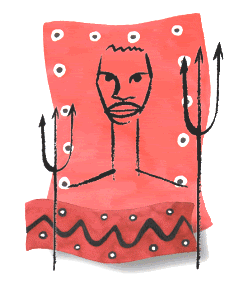to the east my brother, to the east
"Very nearly all that I have given as Rosicrucianism originated in my
soul; and scarce a single thought, only suggestions, have I borrowed from
those who, in ages past, called themselves by that name—one which served
me well as a vehicle wherein to take my mental treasure to a market, which
gladly opened its doors to that name, but would, and did, slam to its portals
in the face of the tawny student of esoterics."
Pascal Beverly Randolph
soul; and scarce a single thought, only suggestions, have I borrowed from
those who, in ages past, called themselves by that name—one which served
me well as a vehicle wherein to take my mental treasure to a market, which
gladly opened its doors to that name, but would, and did, slam to its portals
in the face of the tawny student of esoterics."
Pascal Beverly Randolph
The Umbilini-Kundalini connection is a good way for me to segue into
talking about the concept of "the East" and "the Orient" in Hoodoo.
When talking about "oriental" wisdom's influence on African- American
thought you have to face squarely the racial dynamic that existed
at the time "Orientalism" entered into the culture. To put it bluntly
at that time in America all brown-skinned people were looked upon
as niggers by those of European desent (the "Indians" were "red-skins",
remember?). Egyptian,Middle Eastern, Indian, Polynesian, Aborigine:
all niggers.
This culturally enforced One Love was the vehicle African-American
metaphysicians hotrodded by looking East. African, Middle Eastern
and Indian wisdom came together as one "Eastern" wisdom analogous
to the way all dark-skinned people were regarded in American culture
at that time.
That this reflects a deeper truth was not a happy accident
but a result of the fact that the relevant African-American metaphysicians
had already had a calling and an anointing as they call it in church and
found in Oriental wisdom a way to explain this anointing to others.
The calling, the anointing, came first, from their own perspectives as
African-Americans and then the "box" to put it in, the vehicle as
Beverly put it of Oriental thought, or in Beverly's case Rosicrucianism,
came after.
Beverly's case is particularly poignant because he got one-dropped
Out of his place in history.


0 Comments:
Post a Comment
<< Home